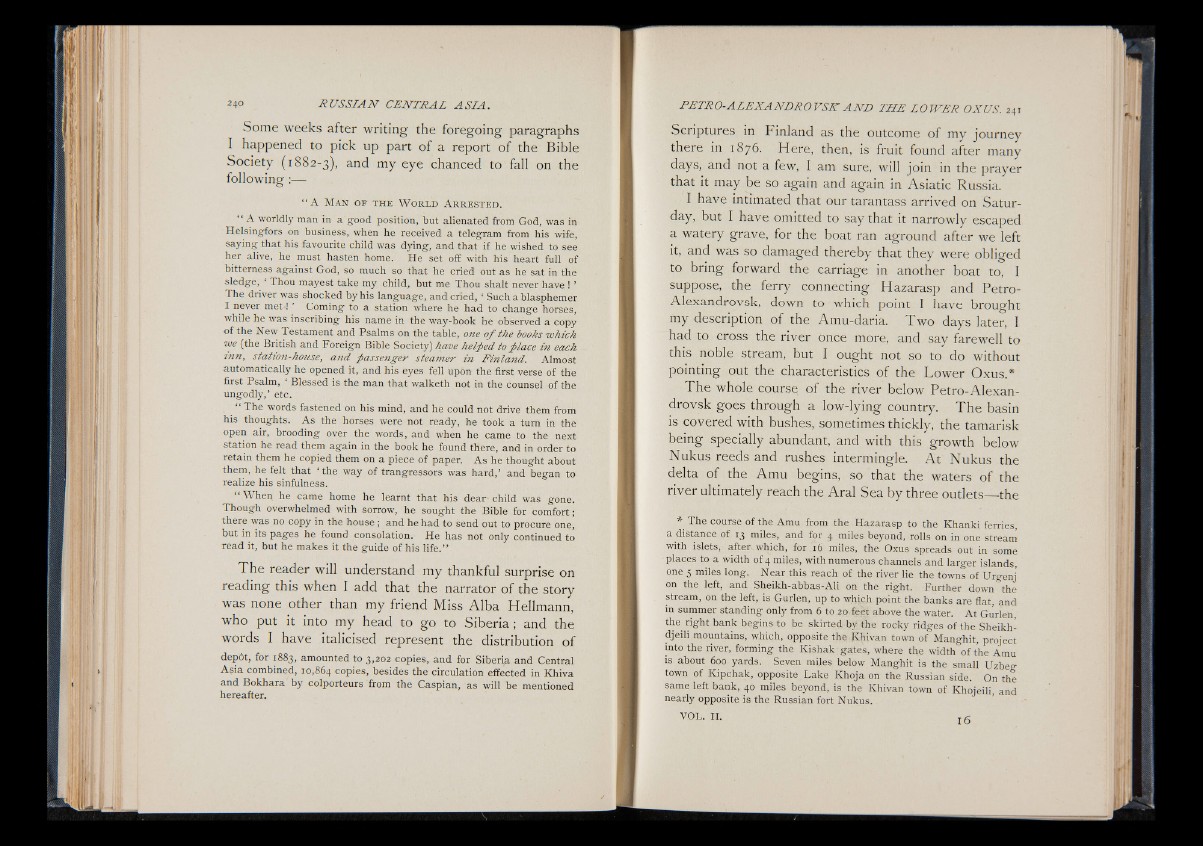
Some weeks after writing the foregoing paragraphs
I happened to pick up part of a report of the Bible
Society (1882-3), an<3 my eye chanced to fall on the
following :—
“ A Ma n o f t h e W o r l d A r r e s t e d .
‘ A worldly man in a good position, but alienated from God, was in
Helsingfors on business, when he received a telegram from his wife,
saying that his favourite child was dying, and that if he wished to see
her alive, he must hasten home. He set off with his heart full of
bitterness against God, so much so that he cried out as he sat in the
sledge, I Thou mayest take my child, but me Thou shalt never have ! ’
The driver was shocked by his language, and cried, ‘ Such a blasphemer
I never met«! Coming to a station where he had to change horses,
while he was inscribing his name in the way-book he observed a copy
of the New Testament and Psalms on the table, one o f the books which
we (the British and Foreign Bible Society) have helped to place in each
inn, station-house, and passenger steamer in Finland. Almost
automatically he opened it, and his eyes fell upon the first verse of the
first Psalm, ‘ Blessed is the man that walketh not in the counsel of the.
ungodly,’ etc.
“ The words fastened on his mind, and hë could not drive them from
his thoughts. As the horses were not ready, he took a turn in the
open air, brooding over the words, and when he came to the next
station he read them again in the book he found there, and in order to
retain them he copied them on a piece of paper. As he thought about
them, he felt that * the way of trangressors was hard,’ and began to
realize his sinfulness.
“ When, he came home he learnt that his dear-child was gone.
Though overwhelmed with sorrow, he sought the Bible for comfort;
there was no copy in the house ; and he had to send out to procure one,
but in its pages he found consolation. He has not only continued to
read it, but he makes it the guide of his life.”
T he reader will understand my thankful surprise on
reading this when I add that the narrator of the story
was none other than my friend Miss Alba Hellmann,
who put it into my head to go to Siberia; and the
words I have italicised represent the distribution of
dépôt, for 1883, amounted to 3,202 copies, and for Siberia and Central
Asia combined, 10,864 copies, besides the circulation effected in Khiva
and Bokhara by colporteurs from the Caspian, as will be mentioned
hereafter.
Scriptures in Finland as the outcome of my journey
there in 1876. Here, then, is fruit found after many
days, and not a few, I am sure, will join in the prayer
that it may be so again and again in Asiatic Russia.
I have intimated that our tarantass arrived on Saturday,
but I have omitted to say that it narrowly escaped
a watery grave, for the boat ran aground after we left
it, and was so damaged thereby that they were obliged
to bring forward the carriage in another boat to, I
suppose, the ferry connecting Hazarasp and Petro-
Alexandrovsk, down to which point I have brought
my description of the Amu-daria. Two days later, I
had to cross the river once more, and say farewell to
this noble stream, but I ought not so to do without
pointing out the characteristics of the Lower Oxus.*
The whole course of the river below Petro-Alexan-
drovsk goes through a low-lying country. The basin
is covered with bushes, sometimes thickly, the tamarisk
being specially abundant, and with this growth below
Nukus reeds and rushes intermingle. A t Nukus the
delta of the Amu begins, so that the waters of the
river ultimately reach the Aral Sea by three outlets -the
The course of the Amu from the Hazarasp to the Khanki ferries,
a distance of 13 miles, and for 4 miles beyond, rolls on in one stream
with islets, after, which, for 16 miles, the Oxus spreads out in some
places to a width of 4 miles, with numerous channels and larger islands,
one s miles long. Near this reach of the river lie the towns of Urgenj
on the left, and Sheikh-abbas-Ali on the right. Further down the
stream, on the left, is Gurlen, up to whicft point the banks are flat, and
in summer standing only from 6 to 20 feet above the water. At Gurleti
the right bank begins to be skirted by the rocky ridges of the Sheikh-
djeili mountains, which, opposite the Kliivan town of Manghit, project
into the river, forming the Kishak gates, where the width of the Amu
is about 600 yards. Seven miles below Manghit is the small Uzbeg
town of Kipchak, opposite Lake Khoja on the Russian side. On the
same left bank, 40 miles beyond, is the Khivan town of Khojeili, and
nearly opposite is the Russian fort Nukus.
VOL. II. I6